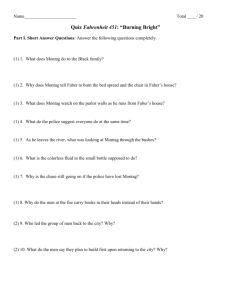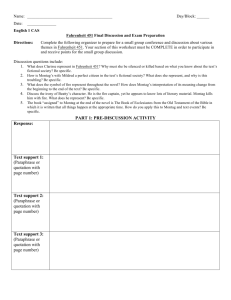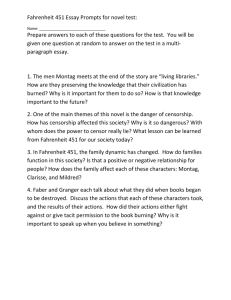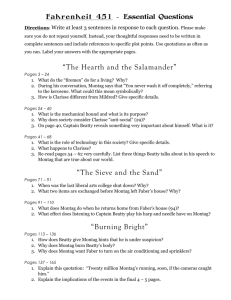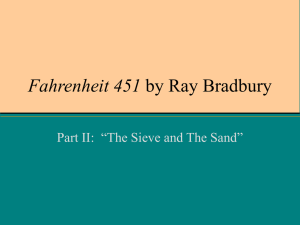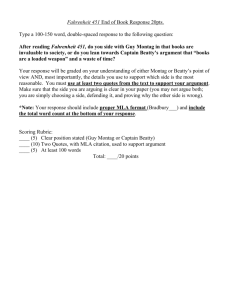Fahrenheit 451 Part 2 “The Sieve and the Sand” Questions 1. How
advertisement
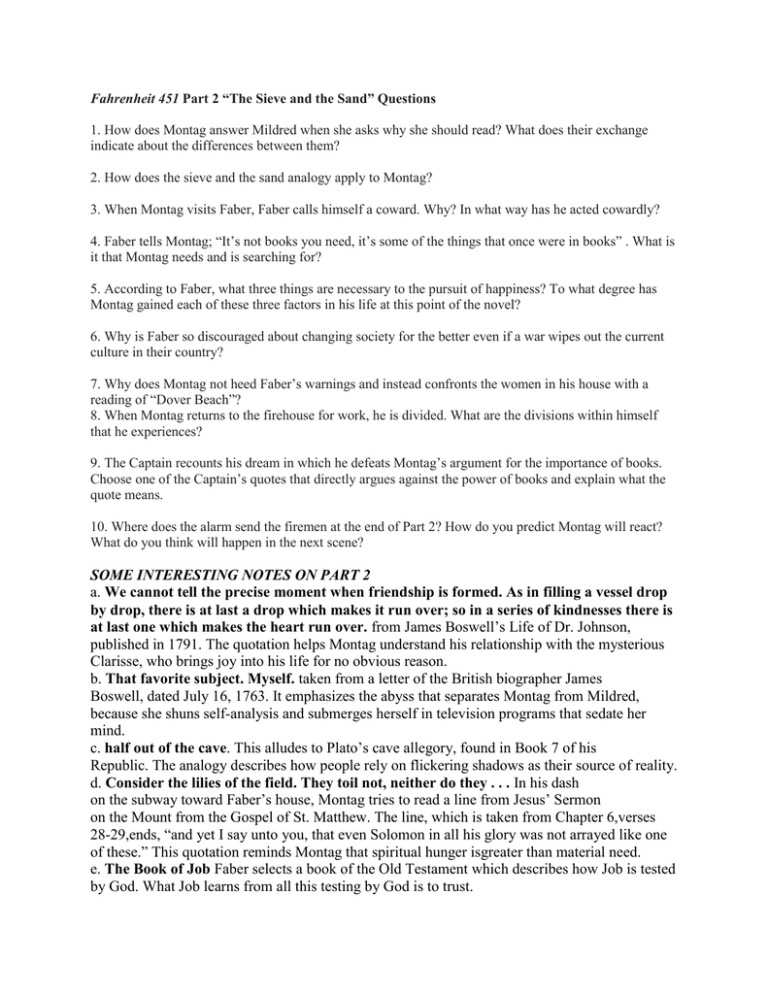
Fahrenheit 451 Part 2 “The Sieve and the Sand” Questions 1. How does Montag answer Mildred when she asks why she should read? What does their exchange indicate about the differences between them? 2. How does the sieve and the sand analogy apply to Montag? 3. When Montag visits Faber, Faber calls himself a coward. Why? In what way has he acted cowardly? 4. Faber tells Montag; “It’s not books you need, it’s some of the things that once were in books” . What is it that Montag needs and is searching for? 5. According to Faber, what three things are necessary to the pursuit of happiness? To what degree has Montag gained each of these three factors in his life at this point of the novel? 6. Why is Faber so discouraged about changing society for the better even if a war wipes out the current culture in their country? 7. Why does Montag not heed Faber’s warnings and instead confronts the women in his house with a reading of “Dover Beach”? 8. When Montag returns to the firehouse for work, he is divided. What are the divisions within himself that he experiences? 9. The Captain recounts his dream in which he defeats Montag’s argument for the importance of books. Choose one of the Captain’s quotes that directly argues against the power of books and explain what the quote means. 10. Where does the alarm send the firemen at the end of Part 2? How do you predict Montag will react? What do you think will happen in the next scene? SOME INTERESTING NOTES ON PART 2 a. We cannot tell the precise moment when friendship is formed. As in filling a vessel drop by drop, there is at last a drop which makes it run over; so in a series of kindnesses there is at last one which makes the heart run over. from James Boswell’s Life of Dr. Johnson, published in 1791. The quotation helps Montag understand his relationship with the mysterious Clarisse, who brings joy into his life for no obvious reason. b. That favorite subject. Myself. taken from a letter of the British biographer James Boswell, dated July 16, 1763. It emphasizes the abyss that separates Montag from Mildred, because she shuns self-analysis and submerges herself in television programs that sedate her mind. c. half out of the cave. This alludes to Plato’s cave allegory, found in Book 7 of his Republic. The analogy describes how people rely on flickering shadows as their source of reality. d. Consider the lilies of the field. They toil not, neither do they . . . In his dash on the subway toward Faber’s house, Montag tries to read a line from Jesus’ Sermon on the Mount from the Gospel of St. Matthew. The line, which is taken from Chapter 6,verses 28-29,ends, “and yet I say unto you, that even Solomon in all his glory was not arrayed like one of these.” This quotation reminds Montag that spiritual hunger isgreater than material need. e. The Book of Job Faber selects a book of the Old Testament which describes how Job is tested by God. What Job learns from all this testing by God is to trust. f. Cheshire Cat a reference to the grinning cat in Lewis Carroll’s Alice in Wonderland. g. Who are a little wise, the best fools be a line from John Donne’s poem “The Triple Fool,” which Beatty uses to confuse Montag. h. the sheep returns to the fold. We’re all sheep who have strayed at times Beatty alludes to the prophecy in Isaiah chapter 53, verse 6; “All we like sheep have gone astray; we have turned every one to his own way; and the Lord hath laid on him the iniquity of us all.” The implied message is that Montag has betrayed his fellow firemen. i. Truth is truth, to the end of reckoning a line from Shakespeare’s Measure for Measure Act V, Scene i, line 45. j. They are never alone that are accompanied with noble thoughts a verse taken from Sir Philip Sidney’s Arcadia. k. Sweet food of sweetly uttered knowledge a line from Sir Philip Sindey's Defense of Poesy. l. Words are like leaves and where they most abound, Much fruit of sense is rarely found a couplet from Alexander Pope’s Essay on Criticism. m. A little learning is a dangerous thing. Drink deep, or taste not the Pierian spring; There shallow draughts intoxicate the brain, and drinking largely sobers us again. a famous pair of couplets from Alexander Pope’s Essay on Criticism, which warns the learner that scholarship requires dedication for maximum effect. n. Knowledge is more than equivalent to force from chapter 13 of Dr. Samuel Johnson’s Rasselas. o. He is no wise man that will quit a certainty for an uncertainty from Dr. Samuel Johnson’s Idler. p. Truth will come to light, murder will not be hid long! from Shakespeare’s Merchant of Venice, Act II, Scene ii, Line 86. q. Oh God, he speaks only of his horse a paraphrase from Shakespeare’s Merchant of Venice, Act I, Scene ii, Lines 3738. r. The Devil can cite Scripture for his purpose from Shakespeare’s Merchant of Venice, Act I, Scene iii, Line 99. s. This age thinks better of a gilded fool, than of a threadbare saint in wisdom’s school a couplet from Thomas Dekker’s Old Fortunatus. t. The dignity of truth is lost with much protesting a line from Ben Jonson’s Catiline’s Conspiracy, Act III, Scene ii. u. Carcasses bleed at the sight of the murderer from Robert Burton’s Anatomy of Melancholy, Part I, Section I, Member 2, Subsection 5. v. trench mouth severe ulceration of the gums, tonsils, and mucous membranes of the mouth resulting from bacterial infection. w. Knowledge is power a line from Francis Bacon’s Advancement of Learning. x. A dwarf on a giant’s shoulders sees the furthest of the two from Democritus to the Reader, Robert Burton’s paraphrase from Lucan’s Civil War. y. The folly of mistaking a metaphor for a proof, a torrent of verbiage for a spring of capital truths, and oneself as an oracle is inborn in us a paraphrase of Paul Valery’s Introduction to the Method of Leonardo da Vinci. z. A kind of excellent dumb discourse a line from Shakespeare’s Tempest, Act III,

